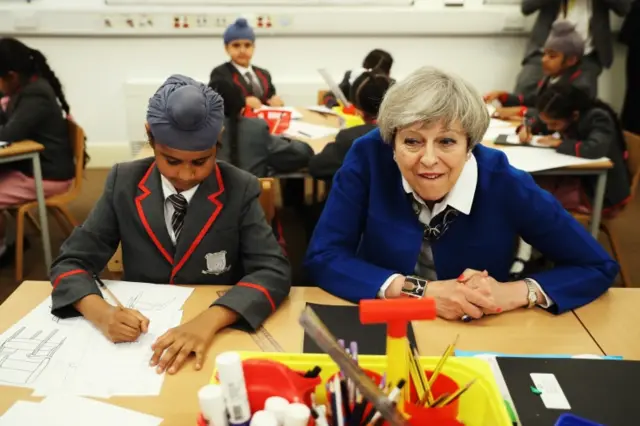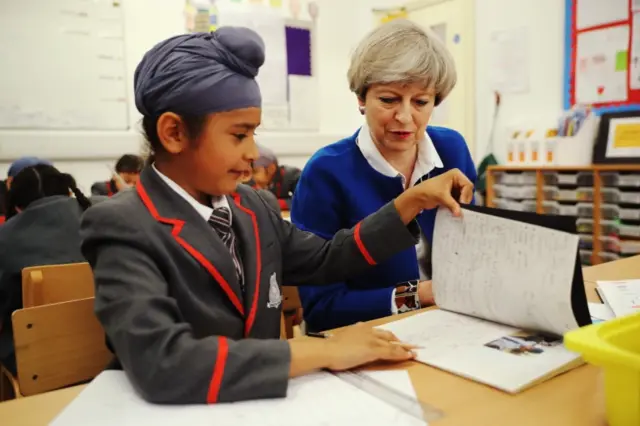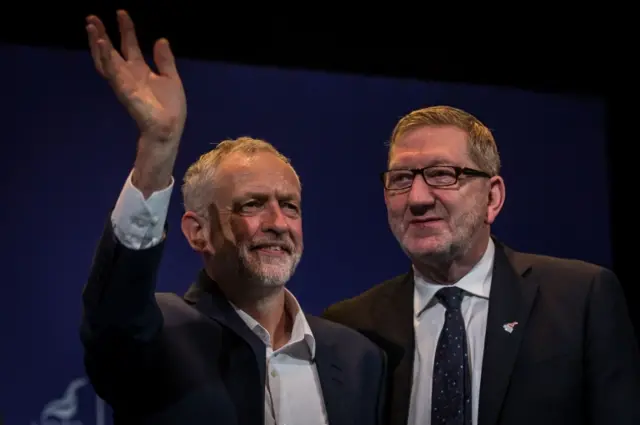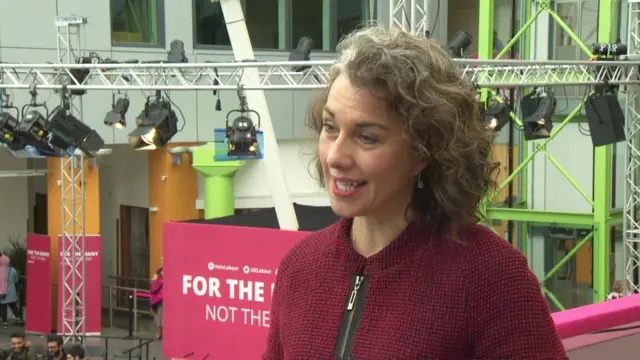Watch: Laura Kuenssberg's three manifesto pointspublished at 14:05 BST 16 May 2017
BBC political editor has been at Labour launch
Labour and Plaid Cymru manifestos
Labour plans water nationalisation...
...more childcare and "excessive pay" levy
45p tax rate from £80,000, 50p from £123,000
Plaid aim to seize Brexit gains for Wales
Lib Dems promise cash for entrepreneurs
Marie Jackson and Claire Heald
BBC political editor has been at Labour launch
 Image source, Getty Images
Image source, Getty ImagesAway from Labour for a moment, Theresa May has been visiting Nishkam Primary School in Birmingham, hailed by the Conservatives as one of the country's first free schools.
The school lies in the Birmingham Ladywood constituency, which Labour's Shabana Mahmood held in 2015 with a majority of 21,868.
 Image source, Getty Images
Image source, Getty ImagesA bit more on the subject of a benefit freeze.
During the Q&A after his big speech earlier, Jeremy Corbyn said: "Yes, increasing benefits is important and clearly we are not going to freeze benefits, that is very clear."
That prompted questions about why such a commitment wasn't in the manifesto.
A short time later reporters asked him if lifting the benefits freeze was a costed pledge, to which the Labour leader said:"We have not made a commitment on that.
"The commitment I make is that I do understand the perverse effects of the cap... and we will be dealing with that in the context of more affordable secure housing and high wages through the living wage."
As things stand Labour's plans could mean people earning between £100,000 and £123,000 will pay 73.2% in tax once employer and employee National Insurance contributions, as well as income tax, are factored in.
That, the Institute for Fiscal Studies points out, is because the party hasn't removed "the absurd and arbitrary marginal income tax band" affecting this group "which arises from the policy described as withdrawing the personal allowance".
The personal allowance - the amount you can earn without it being taxed at all - currently stands at £11,000 but is withdrawn where an individual’s income exceeds £100,000.
 Image source, AFP/Getty
Image source, AFP/GettyOur colleagues in the BBC's Analysis and Research department are going through the manifesto with a fine-tooth comb.
One line says: “Every progressive piece of equality legislation has been delivered by Labour.”
The Lib Dems and Tories who pushed through same-sex marriage might have something to say about that…
Elsewhere in the manifesto it says “it was only through Labour votes that equal marriage became law”, which might be how they’d attempt to justify the first bit.
 The World at One
The World at One
BBC Radio 4
Do Labour want to end the benefits freeze? It wasn't in the manifesto but Jeremy Corbyn promised it at the launch.
Ms Long-Bailey lists a host of changes to the welfare system, but she doesn't say more on a freeze.
Pressed again, she says: "We'll be putting out further details on that in due course."
Martha Kearney pushes her harder for a figure on how much that benefit freeze would cost.
"There's a lot of reviews and reforms in the pipeline."
Moving on, she asked: What about your promise in the manifesto not to raise the pension age beyond 66?
"We'll be setting out our stall on that in due course," says Ms Long-Bailey.
What about looking your promise to look again at the housing benefit cap?
"That would be a subject for long-term review," the shadow business secretary replies.
A selection of your comments
Richard Cooper, Crowborough writes:The Labour leadership can scarcely run its own party, how on earth do they propose to take over and run vast swathes of the economy? As a long-suffering commuter the idea of nationalising the railways is on the surface attractive, but would I trust Labour to make a success of it? No way - it will be the 1970's all over again when we ended up having to be bailed out by the IMF.
Aron Spall, Chesterfield comments:I think the manifesto sounds like a common sense way to tackle the most pressing issues that affect the majority of people in this country. It is about time a party prioritised health and education for the majority of British people.
Henry, London tells us:While I agree with the spirit of the Labour manifesto which is effectively designed to close the gap between the rich and the poor, Jeremy Corbyn has failed to understand the harsh realities of living and working in the UK. Earning a salary of £80,000 does not make you rich! Labour could do well by revising this threshold upwards, and plug the gap by finding ways to actually stimulate the economy
Robert Slocombe, Caerphilly says:I have said this should happen for years. Certain section of British industries should be nationalised for the government to have more control over the standard of living and for the public to profit from what we have put in. This could lead to lower taxation in the future and bring the deficit down rather than filling the pockets of those who already have plenty of cash in them.
 The World at One
The World at One
BBC Radio 4
Shadow business secretary Rebecca Long-Bailey says renationalising the railways would be a capital expenditure so "wouldn't form part of spending plans".
She says the government could take out a low-interest loan to buy back the franchises and that wouldn't cost the taxpayer any money.
You would be increasing borrowing though, it's put to her, perhaps by £70bn?
"Well, £32bn was a reasonable amount that I'd heard from one particular expert, but it's a matter for negotiation," Ms Long-Bailey replies.
 Chris Cook
Chris Cook
Newsnight Policy Editor
This is a very bold manifesto, with a clear philosophical purpose, but the bigger the leap, the harder you have to work to make people understand the nuts and bolts.
Some pledges are hard to make sense of. So, childcare, for example. Labour say they will restructure the childcare market, funding nurseries directly, but we don't really know why.
Capping rail fares; that has a very simple consequence - it costs you money - but that money isn't mentioned in the document.
Hiring more prison guards is another - it's promised but not costed.
It's important to point out, though, that it's hard to be in Opposition, especially in the case of a snap election. Labour doesn't have the civil service to the sums for them and it shows.
 Jo Coburn
Jo Coburn
Daily Politics presenter
The former Liberal Democrat leader correctly guesses himself as the correct answer in an odd-one-out quiz, when he was a guest on the Daily Politics.
Allow X content?
This article contains content provided by X. We ask for your permission before anything is loaded, as they may be using cookies and other technologies. You may want to read X’s cookie policy, external and privacy policy, external before accepting. To view this content choose ‘accept and continue’.
 The World at One
The World at One
BBC Radio 4
Labour donor John Mills says Jeremy Corbyn's policies may have "wider appeal than some people think".
He says he doubts Labour can win the election - although he thinks the gap to the Tories will narrow - but the main thing is that the party isn't wiped out on 8 June.
What kind of message does the manifesto send to entrepreneurs, he's asked.
Mr Mills says governments in the UK "have fallen over backwards to help businesses" at the expense of ordinary people and "a balance has got to be struck".
 The World at One
The World at One
BBC Radio 4
John Mills, businessman and big Labour donor, tells The World at One Mr Corbyn has "keyed in" to many voter concerns, but there are questions about how all of the plans will be paid for.
"In the end, somebody's got to pay for all this and there's a danger that if businesses are hit too hard, and the economy doesn't grow, funding all these promises is going to be a lot more difficult."
 Image source, Gett
Image source, GettUnite general secretary Len McCluskey, above with Jeremy Corbyn is happy with what he sees.
"What Labour is doing today is what Labour does best - offering real change for the many in this country. Labour will invest in our people and build a Britain that we can all be proud of."
Mark Serwotka, general secretary of the Public and Commercial Services Union, is also positive:
"Labour's pledges to end the public sector pay cap, improve collective bargaining, repeal anti-trade union legislation and strengthen employment rights stand in stark contrast to the Conservatives' bogus claims on workers' rights."
 New Statesman
New Statesman
The New Statesman's George Eaton, external says Labour's plans may be seen as radical but they would be regarded as mainstream in most European countries - for example, where utilities are commonly in public ownership.
And though they might not get Jeremy Corbyn elected, he goes on, "the party's next leader will face pressure to embrace many of its policies".
They include plans to build a million new homes, create a National Education Service and provide £5bn a year for the NHS and £2.1bn for social care.
Two more new lines that have appeared since the draft version of the manifesto:
But this one has disappeared from the final version:
 BBC News Channel
BBC News Channel

Labour's Sarah Champion has revealed that the plan to renationalise the water industry was only decided three weeks ago.
The shadow secretary of state for women and equalities told the BBC: “To be quite honest, we’ve had three weeks, so this is an intent.
"So what we need to do is look at the legislation and see exactly what it is that we would pay to shareholders.”
Pushed on whether Labour were prepared for government, Ms Champion said she had only been given one extra member of staff since becoming a shadow minister - that, she said, was "the reality of being in opposition”.
Asked about renationalising the railways she said: “The railways are not actually in private ownership - they are franchised… when the next one comes up; take it back into public ownership.”
The Green Party is, as you'd expect, more positive than the Tories. In fact, Jonathan Bartley, co-leader, says "much of it appears to be based on the Green Party’s 2015 manifesto" - but still misses the mark in some areas.
Quote MessageLabour is trying to be all things to all people and failing. You can't pour money into Hinkley [nuclear power station] and create a renewable energy revolution. You can't solve the air pollution crisis while expanding airports and roads. You can't be a peacebuilder while renewing Trident. You can't transition to a new economic model while hanging onto 20th century ideas where growth is the only answer. It’s time Labour embraced our full vision for the future instead of cherry picking a few good Green policies, then contradicting them."
 Andrew Neil
Andrew Neil
Presenter, The Daily Politics
Allow X content?
This article contains content provided by X. We ask for your permission before anything is loaded, as they may be using cookies and other technologies. You may want to read X’s cookie policy, external and privacy policy, external before accepting. To view this content choose ‘accept and continue’.
BBC reporters tweets...
Allow X content?
This article contains content provided by X. We ask for your permission before anything is loaded, as they may be using cookies and other technologies. You may want to read X’s cookie policy, external and privacy policy, external before accepting. To view this content choose ‘accept and continue’.
 Today Programme
Today Programme
BBC Radio 4
Plaid Cymru's leader has said she expects a Conservative victory will mean their policies become "even more cruel".
"I will expect an increased mandate from the Tories for them to become even more cruel," she said.
Speaking ahead of the release of Plaid Cymru's manifesto, Leanne Wood also discussed Brexit plans, protecting the public sector and comparisons to the SNP.